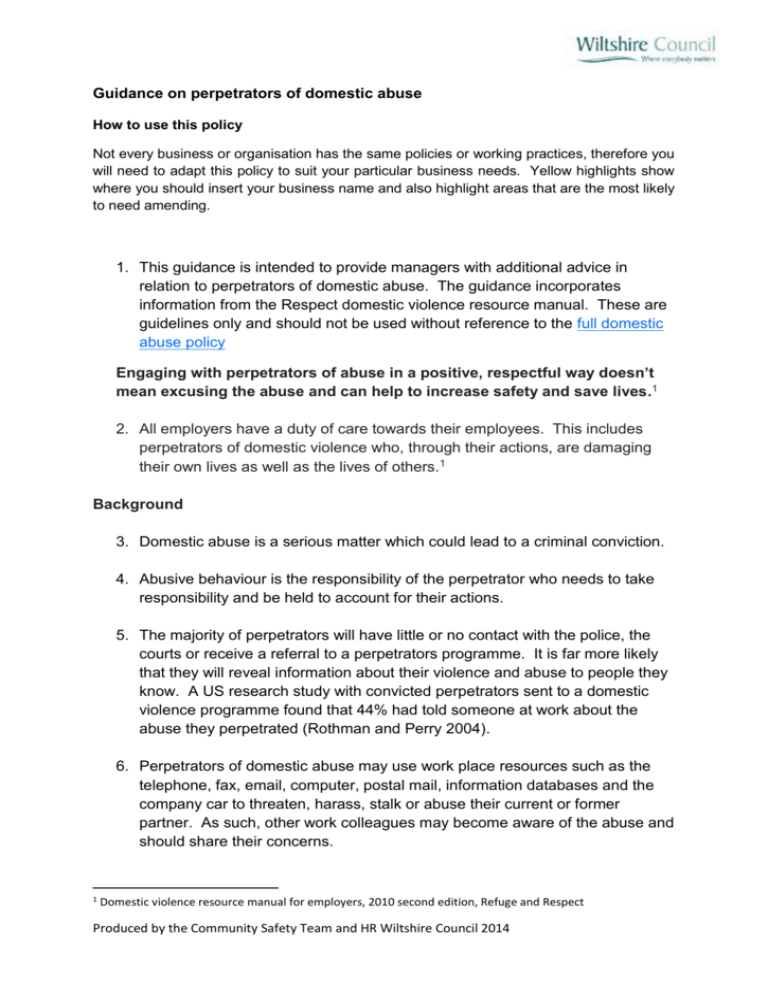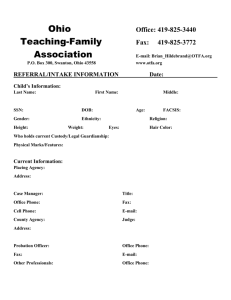Guidance on perpetrators of domestic abuse Guidance on
advertisement

Guidance on perpetrators of domestic abuse How to use this policy Not every business or organisation has the same policies or working practices, therefore you will need to adapt this policy to suit your particular business needs. Yellow highlights show where you should insert your business name and also highlight areas that are the most likely to need amending. 1. This guidance is intended to provide managers with additional advice in relation to perpetrators of domestic abuse. The guidance incorporates information from the Respect domestic violence resource manual. These are guidelines only and should not be used without reference to the full domestic abuse policy Engaging with perpetrators of abuse in a positive, respectful way doesn’t mean excusing the abuse and can help to increase safety and save lives.1 2. All employers have a duty of care towards their employees. This includes perpetrators of domestic violence who, through their actions, are damaging their own lives as well as the lives of others.1 Background 3. Domestic abuse is a serious matter which could lead to a criminal conviction. 4. Abusive behaviour is the responsibility of the perpetrator who needs to take responsibility and be held to account for their actions. 5. The majority of perpetrators will have little or no contact with the police, the courts or receive a referral to a perpetrators programme. It is far more likely that they will reveal information about their violence and abuse to people they know. A US research study with convicted perpetrators sent to a domestic violence programme found that 44% had told someone at work about the abuse they perpetrated (Rothman and Perry 2004). 6. Perpetrators of domestic abuse may use work place resources such as the telephone, fax, email, computer, postal mail, information databases and the company car to threaten, harass, stalk or abuse their current or former partner. As such, other work colleagues may become aware of the abuse and should share their concerns. 1 Domestic violence resource manual for employers, 2010 second edition, Refuge and Respect Produced by the Community Safety Team and HR Wiltshire Council 2014 7. Perpetrators may involve other colleagues (who may or may not be aware of their motives) in assisting them. 8. If an employee is found to be assisting or colluding with abuse or malicious allegations they may also be subject to an investigation and appropriate further action in accordance with council policies and procedures. 9. [your business name] recognises that perpetrators of domestic abuse may need help to change their behaviour and therefore will support and encourage employees to address violent and abusive behaviours of all kinds. This will include providing information about the support and services available. Signs that an employee is perpetrating domestic abuse could include: 10. (This is not an exhaustive checklist) Negative comments made by the abuser about a partner or women and men in general Sexual jealousy or possessiveness Expressing anger and blaming their partner for minor and/or major issues Recent mental ill-health relating to violence Uncharacteristic behaviour such as: Constant text messaging or telephoning a partner late/absent behaviour with no explanation Uncharacteristic moods An obsession with time Repeated injuries/scratches/bite marks/bruised knuckles/injuries to wrists and forearms (this could be a result of the victim defending themselves). 11. It may be that there is another explanation for your observations, however if you are concerned that domestic abuse may be an issue, as a responsible employer, you should discuss this with your employee. 12. Be alert to the possibility of domestic abuse if you hear the following: My partner and I are fighting a lot My partner and I need counselling My partner is not coping and is taking it out on me The kids are out of control and she’s/he’s not firm enough My partner says I need help I’m worried about my rage at work, in the car, in the street, at the football 13. Less obvious comments could include: I need an anger management course Produced by the Community Safety Team and HR Wiltshire Council 2014 I’m not handling stress very well I’m depressed/anxious/stressed/not sleeping/not coping/not myself I feel suicidal (or have threatened or attempted suicide) I’ve got a problem with drink Direct disclosure 14. Some perpetrators may identify their behaviour directly and seek help from their employer. This may be prompted by a crisis such as a particularly serious assault, an arrest or an ultimatum from the abused partner. Indirect disclosure 15. Indirect disclosure of perpetrating domestic abuse may come to light as a result of: A direct allegation shared with the employer by the victim An allegation shared with the employer by a third party, eg an employee suspects or has witnessed another employee abusing their partner Notification by the police or through a DRB check The employee requires time off work to attend court Minimisation and denial 16. Some perpetrators, even when they have sought help voluntarily, are unlikely to disclose the seriousness or extent of their abuse and may try to ‘explain’ or blame it on other people or external factors. Even those who are concerned enough about the abuse to seek help may present with other problems such as alcohol, stress or depression and may not refer directly to the abuse as the problem. How to respond 17. Domestic abuse is a serious issue and how the organisation responds to a perpetrator and their disclosures could affect the extent to which they accept responsibility for their behaviour and therefore the need to change. 18. Do not expect an early full and honest disclosure about the extent of the abuse. 19. Be aware of the barriers to the perpetrator to acknowledging their abuse and seeking help, such as shame, fear of child protection process or self-justifying anger. Produced by the Community Safety Team and HR Wiltshire Council 2014 20. If an employee presents with a problem such as drinking, stress or depression but does not refer to abusive behaviour, these are some useful questions to ask: How is this drinking/stress at work/depression affecting you? Are you worried about the effect this is having on your relationship with your partner and your children? It sounds like you want to make some changes for your benefit and for your partner/children. Would you like to speak to someone who can help you to make some changes? 21. If they have stated that domestic abuse is an issue it is important to encourage them to self-refer to a specialist service. Please see details of support services at the end of this policy. Good practice 22. All people engaging with perpetrators should adopt the following good practice response. Managers are not expected to adopt the role of a support worker however, in exploratory discussions with employees about potential support at work it would be helpful for managers to observe the following principles which are both safe and constructive: Be clear that abuse is always unacceptable and that it may constitute criminal behaviour Be clear that abusive behaviour is a choice Be respectful but do not collude Be positive, it is possible for perpetrators to change if they recognise that they have a problem and take steps to change their behaviour Be aware that on some level the perpetrator may be unhappy about their behaviour Be aware that children are always negatively affected by living with domestic abuse, whether or not they witness it directly Be aware that domestic abuse is about a range of controlling behaviours not just physical violence Be aware of the likely cost to the perpetrator of continued abuse (arrest/loss of relationship/impact on children) and assist them to see this. Actions and decisions 23. Managers may become aware that an employee is a perpetrator of domestic abuse through a variety of routes as described above. 24. The information that the manager and organisation gathers will be the basis for its decision about how best to engage with a perpetrator of domestic abuse and what kind of specialist help is required, either for them directly or to Produced by the Community Safety Team and HR Wiltshire Council 2014 manage the risk to other employees and whether any further action is required. 25. It is important that managers keep a confidential record of a disclosure and any action/decisions that they have taken in relation to the issues outlined below. 26. Managers will need to exercise their responsibility to: Exercise a duty of care towards perpetrators 27. Employees who are perpetrators of domestic abuse may need help to change their behaviour and therefore managers should support and encourage perpetrators to address violent and abusive behaviours of all kinds. This will include providing information about the support and services available to perpetrators. Please see details of support services at the end of this policy. Reduce the risks to the victim and other employees potentially affected at work 28. If the victim of the abuse is also a [your business name] employee managers should follow the advice set out in the section below. (link to section) 29. Managers will also need to give consideration to what potential impact the perpetrators behaviour may have on other employees, assess the risk and take action to reduce or eliminate these risks where they are identified. Such behaviour may be regarded as gross misconduct. 30. Care must be taken at all times with regards to the disclosure of information to the alleged perpetrator. The safety of those at risk from further abuse must be the priority and, for this reason, consideration of what support and information can be provided to the victim needs to be considered at an early stage, along with risk management and contact with specialist agencies. Consider whether any further action is required under relevant [your business name] procedures 31. Allegations of domestic abuse will not automatically lead to an investigation, however, managers of employees who have been formally accused of perpetrating domestic abuse or have come forward to declare this should make employees aware that they will need to consider whether an investigation or further action is required in accordance with council policies and procedures. 32. Managers should be aware that if an employee is accused of serious misconduct and/or criminal offences committed during or outside of working Produced by the Community Safety Team and HR Wiltshire Council 2014 hours which bring them or the council into disrepute they may be the subject of disciplinary action which could lead to dismissal. 33. Employees are also required to notify [your business name] of any caution, reprimand, warning or conviction which they are given after they are appointed. 34. Any disciplinary action or investigations should adhere to [your business name] policies. 35. Expectations in relation to employees conduct are set out in a number of policies. Employees are expected to comply with these policies as a condition of their employment. These include but are not limited to: The code of conduct The behaviours framework The equality and diversity policy and procedure The disciplinary policy and procedure The dignity at work policy and procedure. 36. The line manager of the employee will decide after consulting with their HR contact whether the employee has breached any [your business name] policy. If HR advises that in this instance a policy may have been breached, then an investigation may take place. 37. If it is decided that at this stage no policy has been breached the manager should record the basis on which this decision was reached. The manager should record any other action they have taken in response to the disclosure. 38. Managers may also need to give consideration to the following additional factors: Managers may believe that there is a conflict between the offence and the job the employee is employed to do. In some cases the fact that an employee is a perpetrator of domestic abuse may make certain duties inappropriate and justify redeployment/disciplinary action. For example, it would be inappropriate for a perpetrator of domestic abuse to be providing advice or services to vulnerable men, women and children and/or the public. Some employees represent the public face of an organisation and there may be considerable reputational damage to the organisation if an employee is a perpetrator of domestic abuse. Produced by the Community Safety Team and HR Wiltshire Council 2014 Where a perpetrator of abuse is using work resources such as the telephone, fax, email or company car to harass their partner, this could be construed as misuse of the organisation’s property and contrary to the organisation’s code of conduct. 39. It is important to keep detailed records if an employee discloses abusive behaviours or if someone alleges an employee is a perpetrator of domestic abuse. Good records may help in any further legal proceedings which the victim or the police may take. If the victim and the perpetrator are both employed by [your business name] 40. In some cases, both the abuser and the victim may be employees and in these circumstances both the victim and others in the workplace may be at risk. Harassment and intimidation of a partner who is also an employee of the organisation should therefore be viewed very seriously. 41. If employees are partners and work in close proximity to one another and allegations of domestic abuse arise or are founded by law, you should consider the health and safety implications of all the employees within the work area. 42. Managers of the victim will need to consider whether action is required to minimise the potential for the perpetrator to use their position or work resources to abuse the victim at work. This might include limiting the perpetrators ability to find out details of the victims whereabouts at work, changing duties, if practical, for one or both employees or withdrawing the perpetrators access to certain computer programs. Please note some actions may require co-ordination between the manager of the perpetrator and the manager of the victim. The manager of the victim should consult this employee about confidential contact with the manager of the perpetrator and any proposed actions. 43. It is recognised that in certain circumstances the victim and perpetrator may choose to seek solutions jointly and appropriate support should be given. Contacts for specialist support services The Respect Phoneline - www.respectphoneline.org.uk freephone 0808 802 4040 The Respect Phoneline is a confidential helpline for domestic violence perpetrators (male, female, in heterosexual or same-sex relationships) and professionals who would like further information about services for those using violence/abuse in their intimate partner relationships. They offer information and advice to support Produced by the Community Safety Team and HR Wiltshire Council 2014 perpetrators stop their violence and change their abusive behaviours. The main focus of the Respect Phone line is to increase the safety of those experiencing domestic violence by engaging with the abusers and to reduce the risk. Splitz Support Service - www.splitz.org 01225 775276 Splitz is a local charity which provides support to families, individuals, and children/young people who have experienced difficulty, where that difficulty is related to separation, divorce or domestic abuse and their associated issues. They provide information, advice and support to both victims and perpetrators of domestic abuse. Splitz run specific domestic violence perpetrator programmes for male perpetrators of domestic abuse. Produced by the Community Safety Team and HR Wiltshire Council 2014






